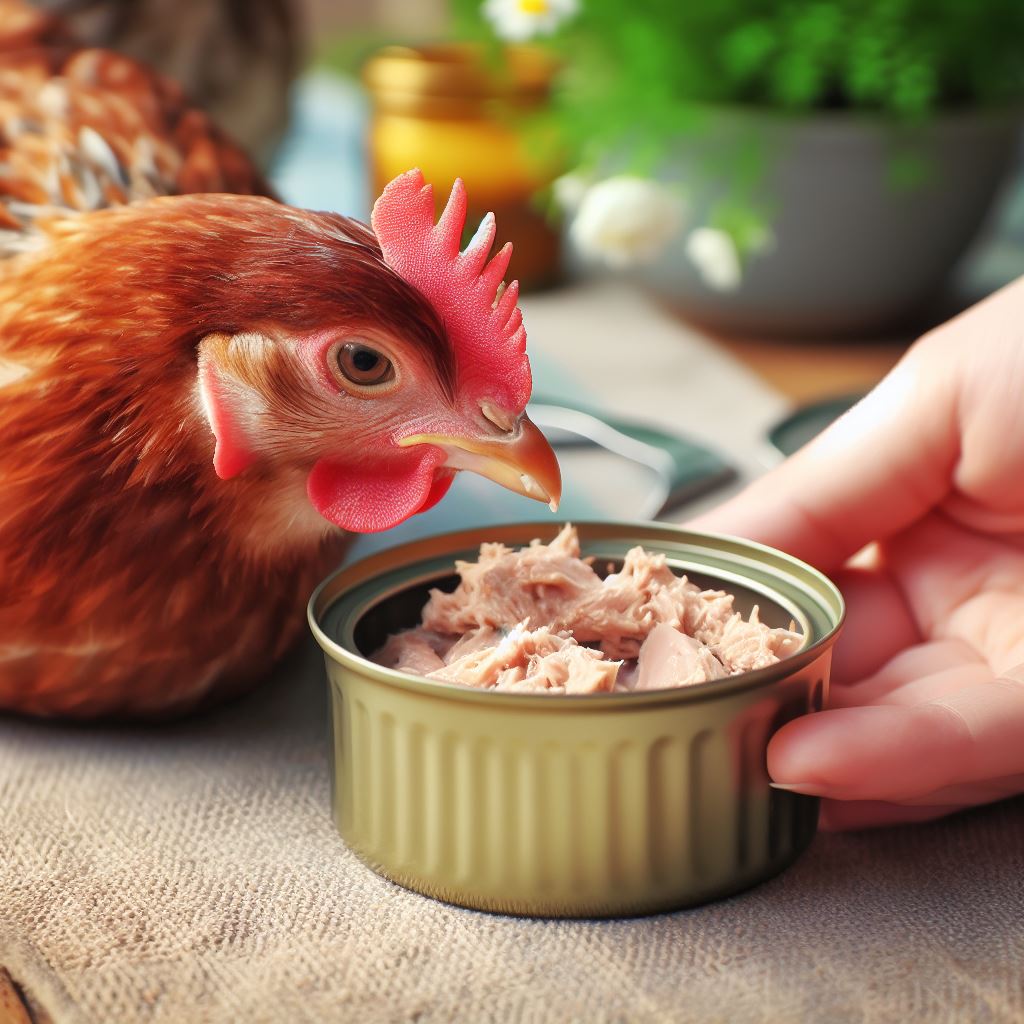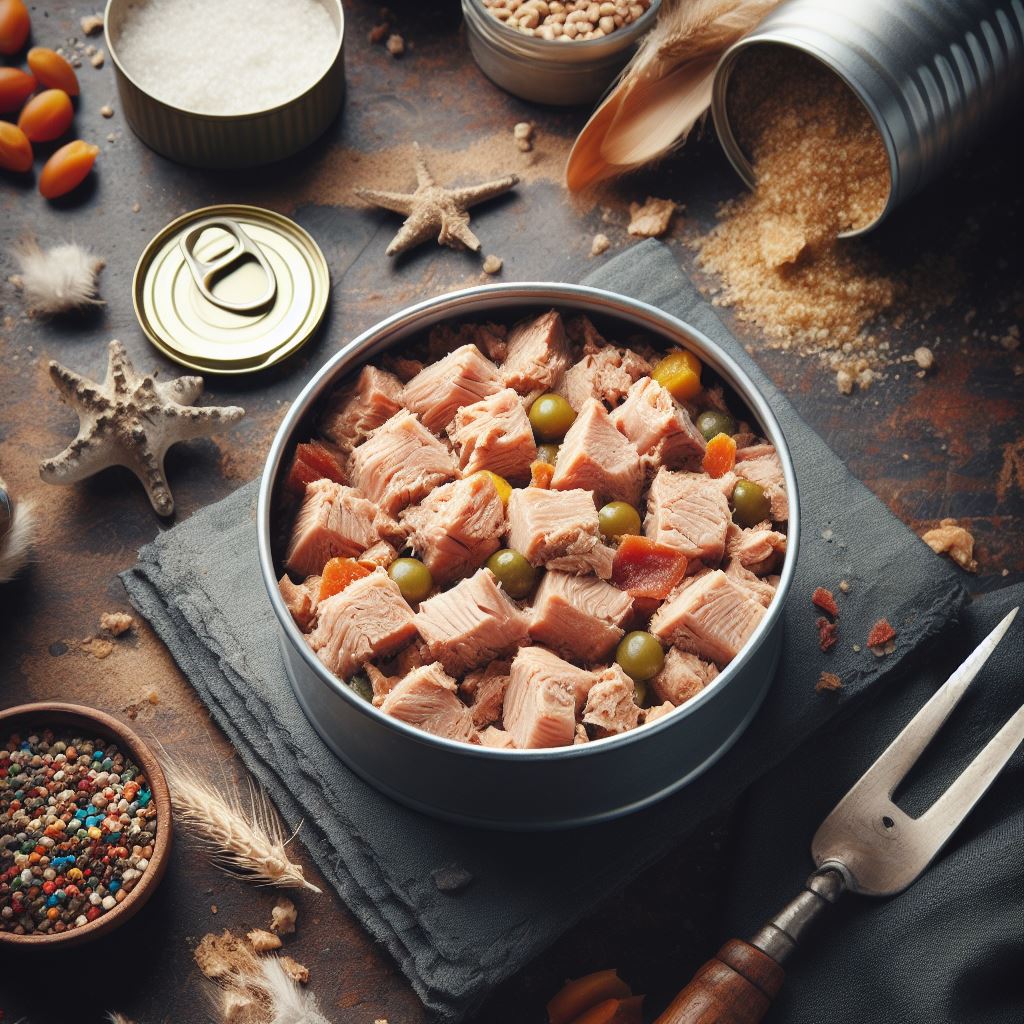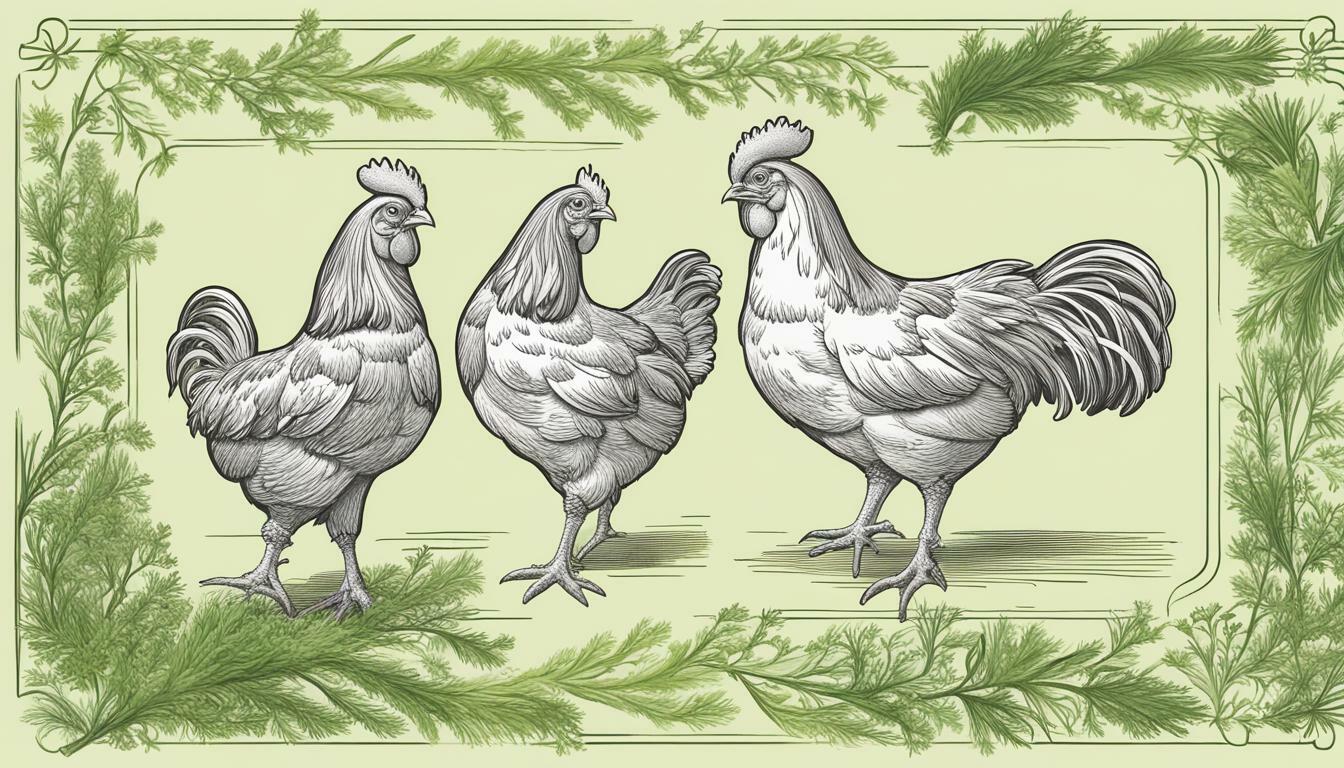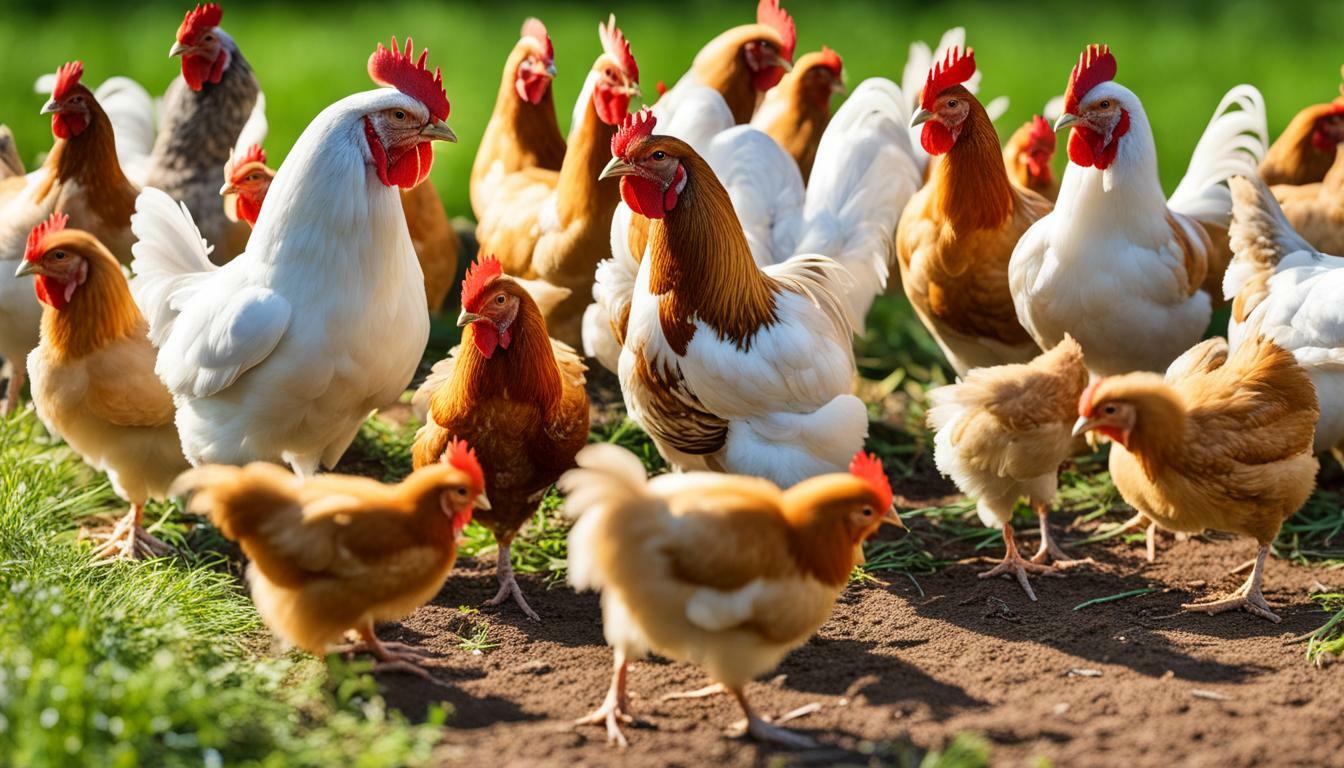Can Chickens Eat Canned Tuna? Benefits and Risks

Table of content:
- Is Canned Tuna Safe for Chickens to Eat?
- Nutritional Benefits of Tuna for Chickens
- Do Chickens Like the Taste of Canned Tuna?
- How Much Tuna Can You Feed Chickens?
- How To Feed Tuna to Chickens
- What Are The Risks of Feeding Chickens Too Much Tuna?
- Are There Benefits to Feeding Chickens Tuna?
- Frequently Asked Questions
- Conclusion
Canned tuna is an affordable, accessible protein source that many people have in their pantries. This leads to the question – can chickens eat canned tuna? The short answer is yes, chickens can eat canned tuna in moderation.
Tuna can offer some nutritional benefits to chickens but there are also some potential downsides to be aware of. Read on as we dive into the details of feeding canned tuna to backyard chickens.
Key Takeaways:
- Canned tuna can be fed to chickens in moderation as an occasional treat.
- Tuna provides protein, omega-3 fatty acids, selenium and other nutrients beneficial for chickens.
- Feed tuna sparingly due to risks like mercury contamination and high sodium content.
- Mix a small amount of tuna with grains or veggie scraps rather than feed it alone.
- Never feed chickens raw tuna due to bacteria risks. Cook it first or use canned.
Is Canned Tuna Safe for Chickens to Eat?
Canned tuna and sardines are safe for chickens to eat in moderation. The canning process kills any bacteria, making canned tuna safer than raw. However, canned tuna still poses some risks:
- Mercury – As a larger predator fish, tuna can contain trace amounts of mercury. Consuming tuna infrequently is unlikely to cause mercury poisoning in chickens but it’s best not to overdo it.
- Sodium – Canned tuna contains added salt, with around 300-500 mg per can. Too much sodium can lead to health issues in chickens so tuna should only be an occasional treat.
- Bones – Some types of canned tuna contain small, soft bones. These generally won’t splinter like chicken bones but can still pose a minor choking hazard.
As long as tuna is fed in moderation as part of a balanced diet, it is unlikely to cause harm. Start with small amounts to see if your flock enjoys tuna and tolerates it well.
Nutritional Benefits of Tuna for Chickens
Tuna is high in protein and healthy omega-3 fatty acids. Here are some of the key nutrients it provides:
- Protein – Tuna is a lean source of protein, which chickens need for muscle development and egg production.
- Omega-3s – Omega-3 fatty acids support chicken health. They are anti-inflammatory and important for metabolism.
- Selenium – Tuna contains selenium, a mineral that boosts immunity and reproductive health in poultry.
- Vitamin B12 – Tuna has vitamin B12 which is required for vital functions like nerve signaling and red blood cell formation in chickens.
- Niacin – Also known as vitamin B3, niacin supports digestive and skin health. Tuna provides an excellent source.
Feeding a small amount of tuna 1-2 times per week can provide beneficial nutrients without overdoing it on the risks.
 Do Chickens Like the Taste of Canned Tuna?
Do Chickens Like the Taste of Canned Tuna?
Most chickens love canned tuna! The strong scent and flavor make it an enticing treat.
Chickens have a diverse palate and appreciate meaty flavors. The oily fishiness of tuna seems appealing to their senses.
Some people even use tuna in recall training or as a high-value training treat for teaching chickens tricks. A tiny nibble of tuna can motivate chickens to pay attention and perform behaviors on cue.
Offer tuna as an occasional snack to break up the monotony of regular feed. This provides mental enrichment and keeps chickens engaged.
How Much Tuna Can You Feed Chickens?
It’s best to limit tuna to no more than 1-2 ounces (28-56g) per chicken per week. This equates to roughly one quarter to half a can of tuna divided between several birds.
Feed tuna in moderation to avoid health issues. Eating tuna daily could lead to excess mercury, sodium, and malnutrition from nutrient imbalances.
Tuna should not make up more than 5-10% of a chicken’s overall weekly diet. Feed it sparingly as a supplement to their regular feed and treats.
Monitor your chickens’ health if feeding tuna frequently. Issues like diarrhea, lack of appetite, or lethargy may be a sign they are getting too much. Each chicken may have a different tolerance level as well.
How To Feed Tuna to Chickens
Here are some tips for safely feeding canned tuna to chickens:
- Mix tuna with grains, rice, veggie scraps or chicken feed rather than feeding it alone. This helps avoid issues from too much protein.
- Remove any bones, which can be a choking risk. Use low-sodium varieties to reduce sodium intake.
- Serve tuna in the morning or evening as a snack vs their main meals. This prevents interfering with their layer feed.
- Split one can between several chickens rather than giving an entire can to one. Monitor to ensure bossier flock members don’t gobble it all up!
- Feed tuna from a communal dish rather than by hand to discourage aggressive behavior and resource guarding.
- Never feed raw tuna due to bacteria risks. Cook it first or use only canned. Discard any spoiled tuna.
With a few precautions, tuna can be a safe, nutritious supplement for backyard chickens. Using it in moderation can give them something different while providing nutritional diversity.
What Are The Risks of Feeding Chickens Too Much Tuna?
Eating tuna daily or in large amounts can pose the following risks for chickens:
- Mercury poisoning – Chickens likely won’t get mercury poisoning from tuna alone but it’s smart to limit exposure.
- Excess sodium – High sodium can lead to issues like dehydration, kidney problems, or heart failure.
- Nutritional imbalances – Too much tuna could lead to deficiencies or toxicity from an unbalanced diet.
- Obesity – Tuna is high in fat. Overfeeding could contribute to obese chickens.
- Territorial behavior – Chickens may fight over tuna if they don’t have enough space when it’s fed.
Moderation is key when feeding tuna. Limit it to a few times a week and watch for signs of issues. Consult a vet if chickens exhibit any abnormalities after eating tuna.
Are There Benefits to Feeding Chickens Tuna?
Here are some of the key benefits of tuna for chickens:
- Protein source – Tuna provides lean protein for development, muscle growth and egg production.
- Omega-3 fatty acids – The healthy fats in tuna support chicken immunity, metabolism, skin, feathers, joints, and more.
- Micronutrients – Tuna contains selenium, B vitamins, niacin, potassium, magnesium, and other key micronutrients.
- Mental stimulation – The strong smell and flavor offer sensory enrichment.
- Treat option – Tuna can be used as a high-value reward for training chickens.
- Diet variety – Adding tuna periodically gives flock nutritional diversity and interest.
In small amounts, tuna can be a beneficial supplement without offering much risk. It gives chickens extra protein, healthy fats, and nutrients while breaking up the monotony of their usual diet.
Frequently Asked Questions
Can chickens eat tuna everyday?
No, chickens should not eat tuna daily or even more than a couple times per week. The risks from mercury, excess sodium, and nutritional imbalances are too high with daily tuna feeding.
Is canned tuna bad for chickens?
Canned tuna is not inherently bad if fed occasionally in moderation. However, overdoing it on tuna can negatively impact chicken health and lead to issues over time.
What are the risks of feeding chickens tuna?
Too much tuna can cause mercury poisoning, sodium toxicity, obesity, fatty liver disease, kidney problems, nutritional deficiencies, territorial aggression, and other issues in chickens. Moderation is key.
Do chickens like canned tuna?
Most chickens love the strong scent and flavor of canned tuna. It’s a highly palatable treat that can be used for training reinforcement.
Is raw or cooked tuna better for chickens?
Never feed chickens raw tuna due to bacteria risks. Cook tuna thoroughly first or use only canned/pre-cooked tuna. Canned is safer and more convenient.
Can I use tuna water for chickens?
Avoid feeding the oily tuna water, as it contains the highest amounts of mercury, sodium, and fish proteins. Stick to the tuna flesh only.
Conclusion
Canned tuna makes a convenient protein-packed snack for chickens. Feed tuna in moderation 1-2 times per week to avoid health issues. Limit tuna to less than 10% of their diet and mix it with grains, veggies, or feed to dilute the protein.
Cook tuna before feeding and avoid raw due to bacteria risks. Remove bones to reduce choking hazards. Monitor chickens closely when introducing tuna to watch for signs of intolerance.
Used infrequently in small amounts, tuna can give chickens extra nutrition and enrichment. With a few precautions, this pantry staple can be a safe, affordable treat chickens devour.
Welcome. I’m Adreena Shanum, the proud owner of this website, and I am incredibly passionate about animals, especially poultry. I founded adreenapets.com as a labor of love, stemming from my desire to share my knowledge and experiences with poultry enthusiasts worldwide.




